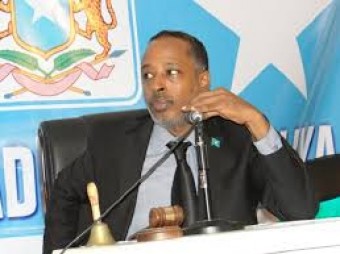Somali parliament speaker denies extension of current gov’t beyond 2016

Somali parliament speaker Mohamed Osman Jawari has denied the extension of the current government beyond 2016.
Jawari told journalists on Saturday that it was clear the term of the current government ends in 2016 and therefore all efforts must be made to ensure there’s transition through a peaceful and credible election process.
“Our term is coming to an end late 2016 and therefore we are remaining with just this year and few months in 2016 to prepare and hold credible elections. There’s no extension to that,” said Jawari.
The speaker said the parliament will in the next session pass all the necessary legislation to facilitate the referendum and elections both to be held in 2016. This, he said, includes political parties laws among others.
On Thursday, the parliament passed the Independent Electoral Commission (IEBC) Bill paving way for the creation of an independent electoral body to oversee the upcoming elections.
The 2016 elections will be a first one in close to 30 years since the collapse of government under the former President Siad Barre in 1991.
Since the formation of the functional government in 2002 and later transitional federal government, elections for the president have been conducted by parliament but with the law, citizens will have the right to choose the leadership of the country.
However, the Horn of Africa nation is still confronting security threats posed by the Al-Qaida linked militant group Al- Shabaab and incessant clan fighting which have escalated the security situation in the country.
Joint operations by the Somali National Army and the Africa Union backed force, AMISOM have made significant inroads into decimating Al-Shabaab, but the militant group still carries attacks on government and military installations and kills government officials.
The tasks ahead for the federal institutions include in particular the establishment of the remaining interim administrations, ensuring a thorough constitutional review process finalized by the end of 2015 with the aim of holding a constitutional referendum in early 2016, and the implementation of the election preparation activities under the auspices of a National Independent Electoral Commission.
Source: Xinhua